Stock Market Distribution Continues
Stock-Markets / Stock Markets 2013 Jan 10, 2013 - 08:07 PM GMT Ireland Lobbies to Have Europe Share Banking Risk:
Ireland Lobbies to Have Europe Share Banking Risk:
Ireland took over the presidency of the European Union on January 2013 for six months. Prime Minister Enda Kenny is thus in a unique position to try to find a solution to the banking crisis that has bedeviled Ireland since 2008. However, the job at hand is not going to be an easy one as reported by Christoph Pauley of Spiegel Online on the 7th. January:
"Ireland's reform policies have been widely praised for helping it emerge from the crisis, but the truth is bleaker. If the government fails to get European taxpayers to assume some of the risk of its ailing banking sector, the country could soon require another bailout.
In his home country, Irish Prime Minister Enda Kenny, 61, has a reputation for being somewhat wooden. But when he meets with German Chancellor Angela Merkel and other top German politicians, he's capable of unaccustomed gallantry, as the Irish have noted with surprise. For instance, Kenny has recently proved that he's a master of the diplomatic art known as "air kissing."
This Tuesday, the Irishman will have yet another opportunity to demonstrate his skills. Kenny is traveling to the southern German village of Wildbad Kreuth, where the conservative Christian Social Union (CSU) -- the Bavarian sister party to Merkel's Christian Democratic Union (CDU) -- is holding its annual gathering. At it, Kenny hopes to schmooze with Horst Seehofer, the CSU's chairman, and Gerda Hasselfeldt, head of its federal parliamentary group. Shortly after breakfast, and before a speech by the chairman of the Bavarian Farmers' Association, Kenny plans to present his country as a model of successful reform policies.
Kenny's charm offensive is not entirely altruistic. For over two years -- and to the delight of the Anglo-Saxon media -- the conservative leader has been trying to get European taxpayers to foot the enormous bill for bailing out Ireland's ailing banking sector. But, taking their cue from the Germans, the Europeans have so far balked at the idea.
Instead, Chancellor Merkel has been quick to praise the way Ireland has implemented economic reforms and used money from European bailout funds over the past few years to emerge from the crisis: Exports have risen, the country has regained its competitiveness, and it has even succeeded in getting private creditors to lend it some money.
Unfortunately, this gleaming façade obscures a rather dismal reality. Although Ireland's economy has stabilized, its debts continue to mount -- despite the fact that the country has been diligently fulfilling all of the demands made by the troika of lenders, which consists of the European Commission, the International Monetary Fund (IMF) and the European Central Bank (ECB). This year, Ireland's public debt is expected to increase to 122 percent of its annual gross domestic product (GDP) -- in other words, beyond the limit at which the IMF believes long-term debt sustainability can be achieved.
The €68 billion ($90 billion) in bailout funds are only expected to meet the country's financial needs until the end of 2013. But Ireland has a trick up its sleeve that it hopes will allow it to avoid a second official aid package: Kenny would like to transfer one-quarter of Ireland's public debt -- the amount that was amassed solely from bailing out the country's banks -- to the EU. "By June, following the decision of the European Council, we expect agreement on the modalities of reducing the burden that the Irish taxpayer took on from the recapitalization of the going-concern banks," Kenny reportedly said shortly before Christmas.
Spreading the Pain
On Jan. 1, Ireland assumed the presidency of the European Council, which rotates every six months. During this period, Kenny is expected to forge important compromises among the EU's 27 member states. But, more importantly, he intends to use his position to highlight Irish concerns.
Ireland's demands are very precise -- and could be costly for the Germans. At stake are the €31 billion that the country received from the system of European central banks to save two crisis-ridden Irish financial institutions in 2010. The country is expected to pay this money back in installments over the next 10 years.
Already last year, the Irish pushed long and hard until they were allowed to pay back the first installment with the help of a new loan. But that was not a long-term solution. Starting this year, the state will explicitly be liable for the debts of Ireland's nationalized banks. This has prompted the Irish to look for a more creative solution this year. "We would like the payback period for the debts to be extended and the interest rates to be cut to a reasonable level," European Affairs Minister Lucinda Creighton told SPIEGEL.
This notion has met with resistance from the ECB, however. ECB President Mario Draghi regularly snubbed Kenny when he broached the topic at the numerous Brussels summits last year. The ECB wants to avoid any more accusations of directly financing ailing euro-zone member states. For Draghi, the simplest solution would be for the European Stability Mechanism (ESM), the euro zone's €700 billion permanent backstop fund, to step into the breach and take over the debt.
Kenny would ideally like to use the ESM as a way of getting European taxpayers to shoulder the risks associated with all the debts of the Irish banking sector. He intends to use the six months of his European presidency to push through a banking union that would also make the bailout fund responsible for dealing with toxic assets in the European banking system left over from the financial crisis of 2007-2008.
But to achieve this, Kenny will need the support of Chancellor Merkel and Germany's parliament, the Bundestag. If he manages to push through his agenda, Europe's taxpayers will have to absorb a significant portion of the risks of Ireland's banking sector. If the Germans refuse, it will become more likely that Ireland will have to be bailed out a second time this autumn.
It looks as if Kenny's newfound talent still has to be put to the test."
Should Ireland not be able to negotiate a "sharing of the banking pain" and actually require a second bailout it will not be good news for the Euro. Such an outcome would send to the bond markets the message that even the "best pupil in the class" cannot successfully emerge from austerity. This would indicate that Greece, Portugal and Spain, who have far less growth than Ireland, would have no chance of ever achieving economic independence. Accordingly, the market would anticipate that Euro-wide austerity would need to go on for at least another 4 year lending-cycle with no certainty of success. This would spell deep trouble for Euroland which is why I believe, "come hell or high water" Prime Minister Kenny will get what he needs. The European Commission sorely wants to be able to announce that Ireland can at last herald the departure of the hated "troika of austerity". Thus Irish financial sovereignty would finally be at hand following 4 years of harrowing fiscal deflation. "Where Ireland goes the rest could follow" will be the Brussels' mantra. What a positive message such a result would spell for the Euro. For many this would be a most unexpected outcome but they say you can always count on "the luck of the Irish" even in a year with a "13" numeral.
Stock Distribution Continues:
Ostensibly there is strong momentum in the stock market but I am not convinced.
Dow Theory wise we have seen a strong breakout from the 2012 trend in the Transports and the Industrials are moving relentlessly towards previous all time highs but I still observe that many stocks, particularly those with high earnings growth stats, are still trading below their 200 daily moving averages. This is not a good sign and indicates to me that professional distribution is taking place.
Dow Transports: Weekly
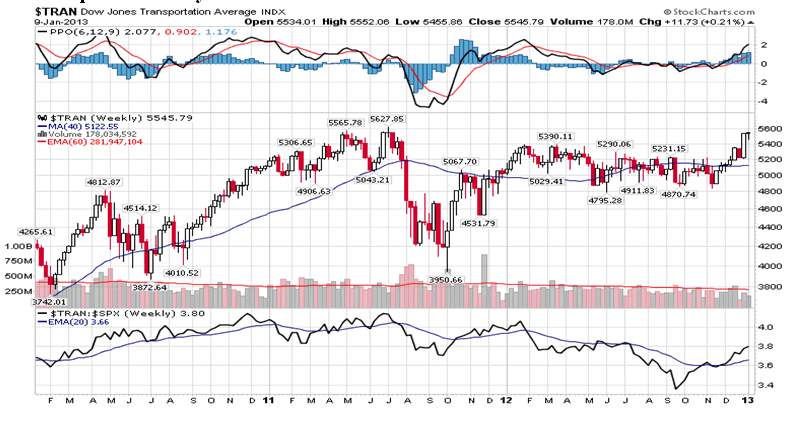
Dow Industrials: Weekly
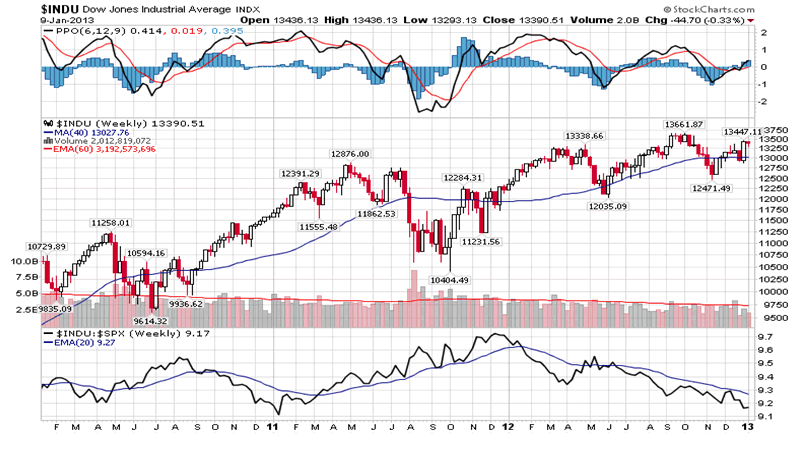
Distribution is where fund managers, in anticipation of a future stock market decline, sell into rally highs thus diminishing their power. Distribution is indicative of an anticipated bear market. To support this thesis I continue to attach the following charts: AAPL. BIDU, BBBY, MSFT, BWLD, DLTR, MNST and DG:
Apple Inc: Daily
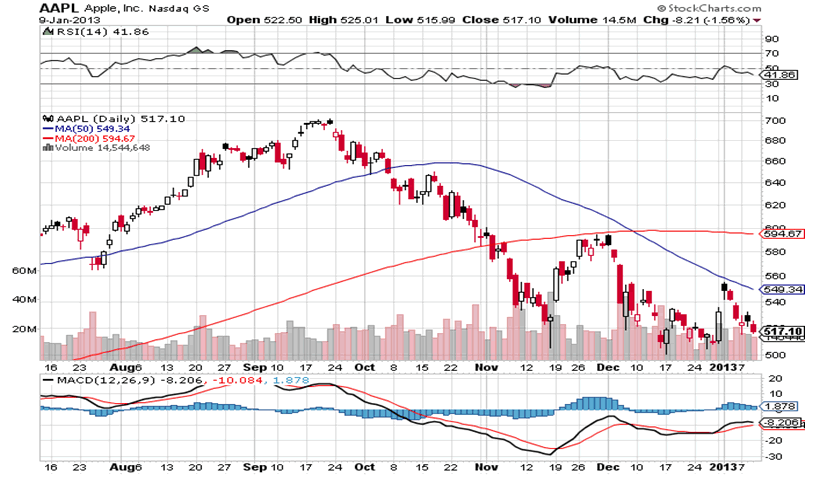
Baidu Inc: Daily
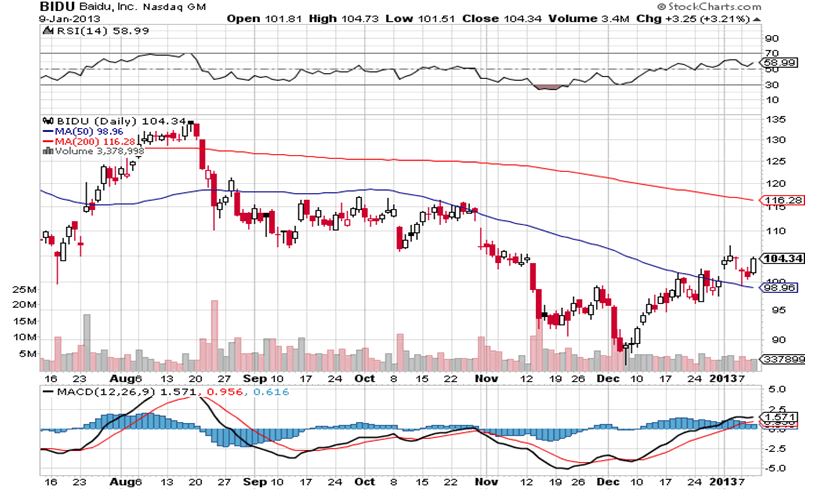
Bed, Bath & Beyond Inc: Daily
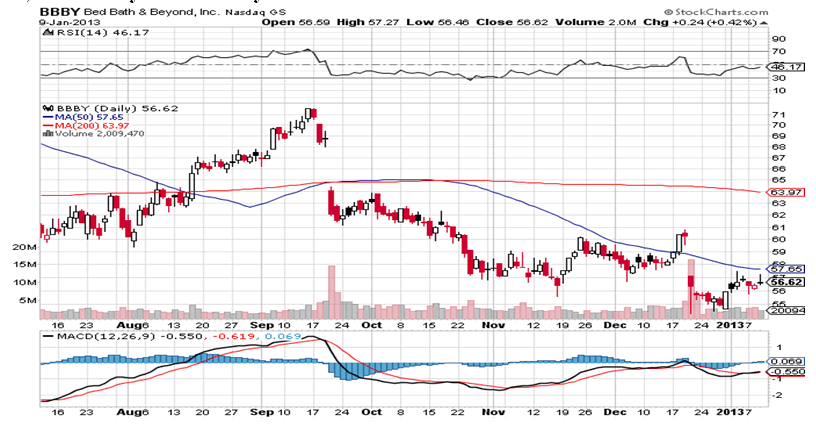
Microsoft Corp: Daily
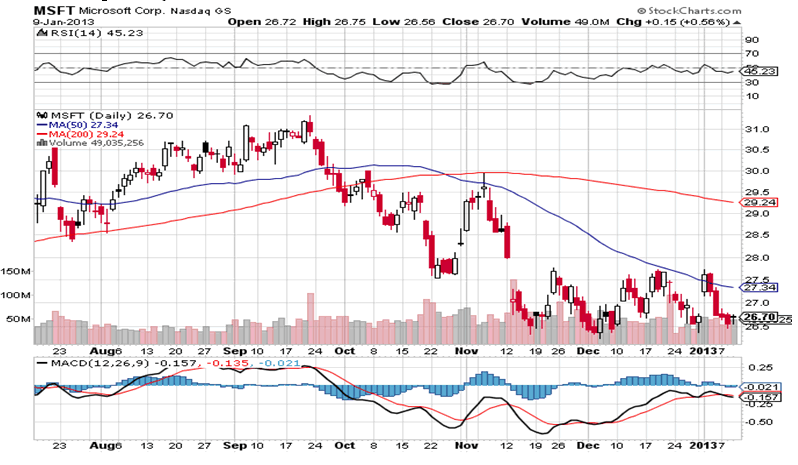
Buffalo Wings Wild Inc: Daily
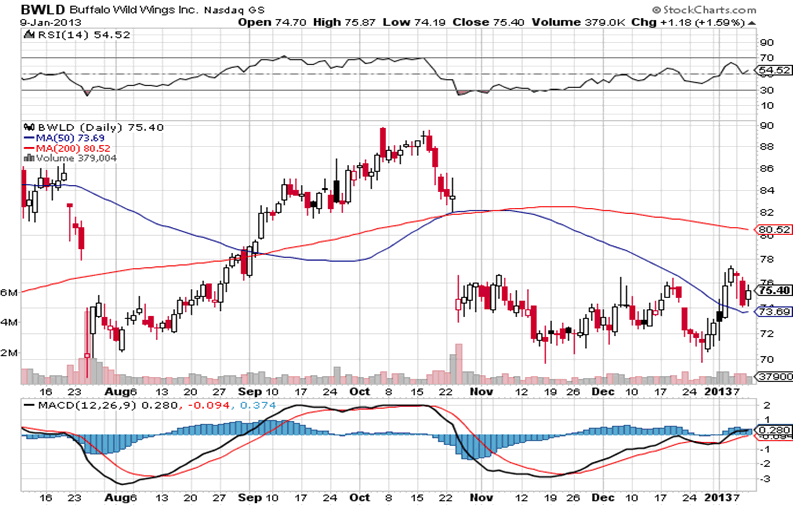
Dollar Tree Inc: Daily
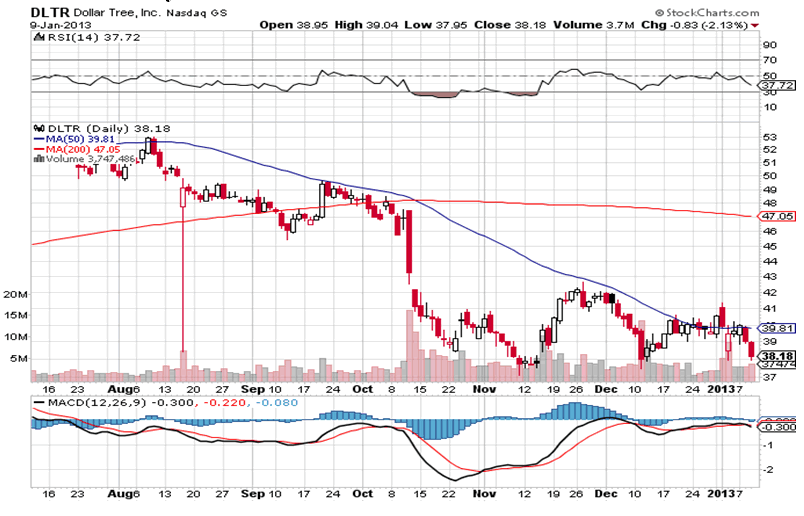
Monster Beverage Corp: Daily
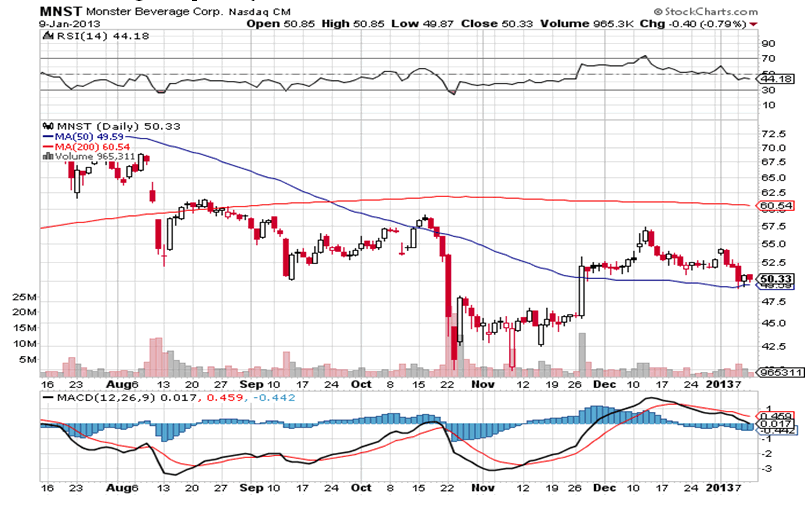
Dollar General Corp: Daily
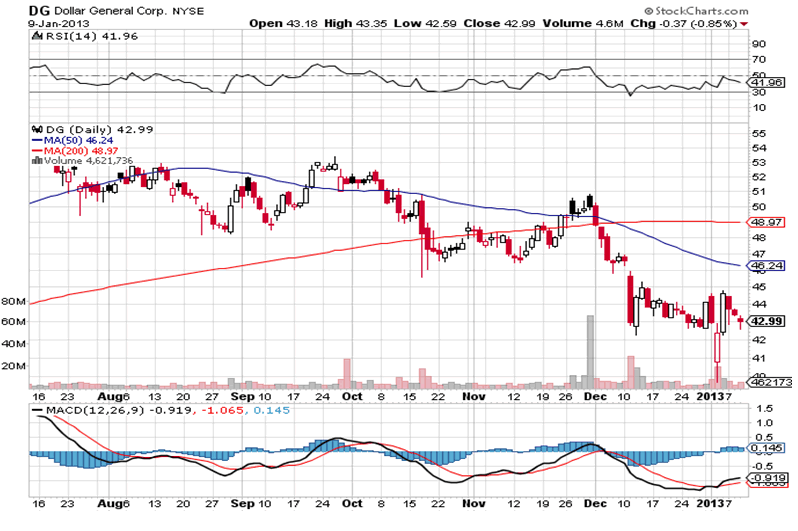
I await to have my skepticism quashed through more positive price action. Until then I advise the mitigation of capital risk through the purchase of equities only following strong market pullbacks and by the protection of any exposure through the disciplined use of stringent stop losses.
Charts: Courtesy of StochCharts.com
By Christopher M. Quigley
B.Sc., M.M.I.I. Grad., M.A.
http://www.wealthbuilder.ie
Mr. Quigley was born in 1958 in Dublin, Ireland. He holds a Bachelor Degree in Accounting and Management from Trinity College Dublin and is a graduate of the Marketing Institute of Ireland. He commenced investing in the stock market in 1989 in Belmont, California where he lived for 6 years. He has developed the Wealthbuilder investment and trading course over the last two decades as a result of research, study and experience. This system marries fundamental analysis with technical analysis and focuses on momentum, value and pension strategies.
Since 2007 Mr. Quigley has written over 80 articles which have been published on popular web sites based in California, New York, London and Dublin.
Mr. Quigley is now lives in Dublin, Ireland and Tampa Bay, Florida.
© 2013 Copyright Christopher M. Quigley - All Rights Reserved
Disclaimer: The above is a matter of opinion provided for general information purposes only and is not intended as investment advice. Information and analysis above are derived from sources and utilising methods believed to be reliable, but we cannot accept responsibility for any trading losses you may incur as a result of this analysis. Individuals should consult with their personal financial advisors before engaging in any trading activities.
Christopher M. Quigley Archive |
© 2005-2022 http://www.MarketOracle.co.uk - The Market Oracle is a FREE Daily Financial Markets Analysis & Forecasting online publication.



